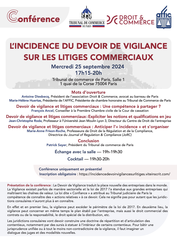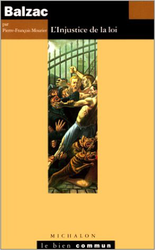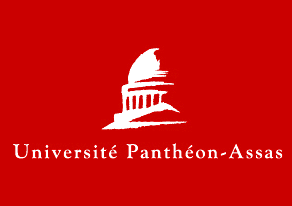Oct. 2, 2025
Thesaurus : Doctrine

► Full Reference: Fr. Ancel, "Devoir de vigilance et litiges commerciaux : une compétence à partager ?" (Duty of Vigilance and commercial disputes: a jurisdictional competence shared ?), in M.-A. Frison-Roche (dir.), L'Obligation de Compliance, Journal of Regulation & Compliance (JoRC) and Lefebvre-Dalloz, coll. "Régulations & Compliance", 2025, 727-740.
____
📕read the general presentation of the book, L'Obligation de Compliance, in which this contribution is published
____
► English summary of this contribution (done by the Journal of Regulation & Compliance - JoRC) : The author considers the procedural issues raised by the duty of vigilance as the "cutting edge" of Compliance Law. After recalling the obligations imposed by the French 2017 law so-called "Vigilance Law" with regard to the Vigilance Plan, he emphasises the 2 types of action instituted by the law to ensure compliance with the duty of vigilance: the preventive action to put an end to the unlawful act, initiated after the formal notice has been served, and the civil liability action that can be brought under the conditions of general tort law, once the damage has occurred.
It is the French 2021 law so-called "Confidence Law" that has targeted the Paris Judicial Court of First Instance, in a jurisdiction that can be described as 'special' rather than exclusive. The author looks in detail at the disputes that this law both puts an end to and yet triggers in its turn, going back over the case law of the French Cour de cassation, which referred to the very nature of the Vigilance Plan and the subject matter of the dispute. It is therefore clear that the dispute may concern only the validity of the plan, in which case the Paris Court of first instance has jurisdiction, or it may concern a dispute, for example, between the company that drew up the plan and one of its partners, in which case jurisdiction is shared.
The article details all the procedural situations involving disputes in which the Vigilance Plan is more or less at the centre, which more or less implies either a lack of jurisdiction, or a stay of proceedings, or knowledge of the entire dispute by a court other than the Paris Court àf first instance, with the author proposing methods each time to develop case law so that the Duty of Vigilance does not emerge fragmented, at the same time as other jurisdictions, for example the commercial courts, will be dealing with the duty of vigilance insofar as it interferes with actions relating to commercial companies, the Plan having a direct link with the management of these companies, with the new definition of the corporate purpose of companies and with the exercise of the power of management of companies. According to the author, this "judicial syncretism", expressed in the case law of the Cour de cassation, is part of Compliance Law, which goes beyond the distinction between the traditional branches of law.
To give concrete form to this general view, the author states that when the subject of the action is the legality or validity of the plan, it therefore falls within the jurisdiction specially conferred by law on the Paris Court of First Instance. However, when the plan is only mentioned in an ancillary manner, and/or the duty of vigilance is mentioned in another capacity, the natural jurisdiction of the case law remains, for example if the nullity of a contractual stipulation is alleged. It is possible that this type of dispute is more frequent and more important than actions based primarily on the illegality of the Vigilance Plan. This contractual dispute could also arise from the fact that the company contractually imposes compliance with its own Vigilance Obligation on its employees and partners as part of the "adapted actions".
Judges, for example commercial judges, are then justified in interpreting and applying Vigilance obligations in the spirit of the law, particularly with regard to the aims pursued. It will be important for a common approach to emerge.
________
🦉this article is fully available for people enrolled in courses taught by Professor Marie-Anne Frison-Roche
________

Sept. 25, 2024
Organization of scientific events

🌐follow Marie-Anne Frison-Roche on LinkedIn
🌐subscribe to the Newsletter MAFR Regulation, Compliance, Law
____
► Full Reference: M.-A. Frison-Roche, coordination of the conference L'incidence du devoir de vigilance sur les litiges commerciaux (The impact of the duty of vigilance on commercial litigation), Tribunal de commerce de Paris (Paris Commercial Court), Droit & Commerce and Association Française en Faveur de l'Institution Consulaire (AFFIC), Tribunal de commerce de Paris, 25 September 2024, 5.15p.m. to 8p.m.
____
🧮see the full programme of this event
____
🌐consult on LinkedIn a general présentation of this event (in French)
____
► General presentation of the conference: The Duty of Vigilance reflects the new role of firms in the world. Vigilance sometimes existed on a sectoral basis, but the 2017 French law extended it to large companies that control value chains. The French so-called "confiance" law gave the Tribunal judiciaire de Paris (Paris First Instance Civil Court) jurisdiction to hear "actions relatives" ("actions relating") to this duty. This does not mean, however, that the commercial courts will no longer have jurisdiction.
Firstly, vigilance may go beyond the scope of the 2017 French law. Secondly, vigilance may concern not only the plan drawn up by the firm, but also Commercial Contract Law or Liability Law, special Distribution Law, etc.
Commercial courts will have to develop a doctrine for dividing up and coordinating disputes, in particular by staying proceedings within certain disputes. To build a unified or at least non-contradictory case law on vigilance, we need to imagine a dialogue between judges and new procedures.
____
🧮Programme of this event:
L'INCIDENCE DU DEVOIR DE VIGILANCE SUR LES LITIGES COMMERCIAUX
(THE IMPACT OF THE DUTY OF VIGILANCE ON COMMERCIAL LITIGATION)
Paris First Instance Commercial Court, room 1
🕰️5.15pm.-5.30pm. Welcome
🕰️5.30pm.-5.40pm. 🎤Mots d'ouverture (Opening words), by 🕴️Antoine Diesbecq, President of Droit & Commerce, attorney at the Paris Bar and 🕴️Marie-Hélène Huertas, President of AFFIC, Honorary President of Chamber of the Paris First Instance Commercial Court
🕰️5.40pm.-6pm. 🎤Devoir de vigilance et litiges commerciaux : Une compétence à partager ? (Duty of Vigilance and Commercial Litigation: A jurisdiction to share?), by 🕴️François Ancel, Judge at the Première Chambre civile de la Cour de cassation (First Civil Chamber of the French Court of cassation)
🕰️6pm.-6.20pm. 🎤Devoir de vigilance et litiges commerciaux : Expliciter les notions et qualifications en jeu (Duty of Vigilance and Commercial Litigation: Explain the concepts and qualifications involved?), by 🕴️Jean-Christophe Roda, Full Professor at Jean Moulin Lyon 3 University, Director of the Centre de Droit de l’entreprise
🕰️6.20pm.-6.40pm. 🎤Devoir de vigilance et litiges commerciaux : Anticiper l''incidence" et s’organiser (Duty of Vigilance and Commercial Litigation: Anticipating the "impact" and getting organised), by 🕴️Marie-Anne Frison-Roche, Professor of Regulatory Law and Compliance Law, Director of the Journal of Regulation & Compliance (JoRC)
🕰️6.40pm.-7pm. 🎤Conclusion (Conclusion), by 🕴️Patrick Sayer, President of the Tribunal de commerce de Paris (Paris First Instance Commercial Court)
🕰️7pm.-7.30pm. Discussion with the audience
🕰️7.30pm.-8pm. Cocktail
________
June 20, 2024
Thesaurus : Doctrine
► Référence complète : V.-O. Dervieux, "Israël à Eurosatory : la justice éparpillée « façon puzzle » ?", Actu-Juridique.fr, 20 juin 2024.
____
June 12, 1996
Thesaurus : Doctrine

référence complète : Mourrier, P.-F., Balzac, l'injustice de la loi, coll. "Le bien commun", éd. Michalon, 1996, 116 p.
Lire la quatrième de couverture.
"Le Code civil, le grand fait vrai de la Comédie humaine".
Pour Pierre-François Mourier, Balzac est un "déçu de la Loi", puisque le Code de commerce, tout au service des commerçants efface le Code civil
Sept. 15, 1993
Publications

► Référence complète : M.-A. Frison-Roche & M. Germe, Le sort des plans de redressement des entreprises en difficulté, Etude et rédaction d'un rapport demandé par l'Observatoire de la vie économique du Tribunal de commerce de Paris, Rapport général sur Le sort des plans de redressement des entreprises en difficulté, en collaboration avec Michel GERMAIN, pour le Laboratoire de sociologie juridique de l’Université Panthéon-Assas (Paris II), dans le cadre de l’Observatoire de la Vie Economique, mis en place par le Tribunal de commerce de Paris, remis en septembre 1993.
A partir des conclusions de ce rapport, deux articles ont été publiés : Le sort des engagements non-financiers des plans, 1994 ; Les engagements non-financiers et le commissaire à l'exécution, 1994.